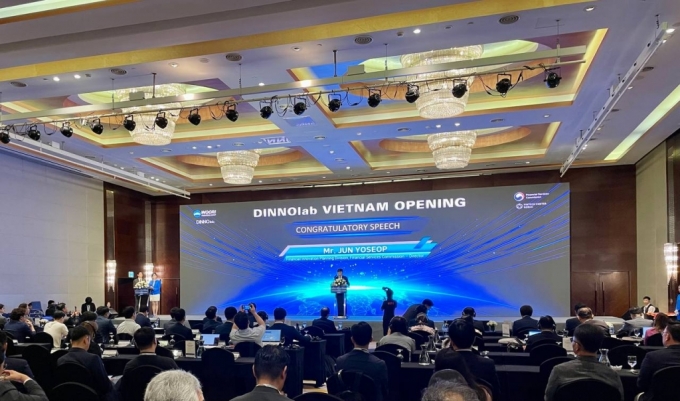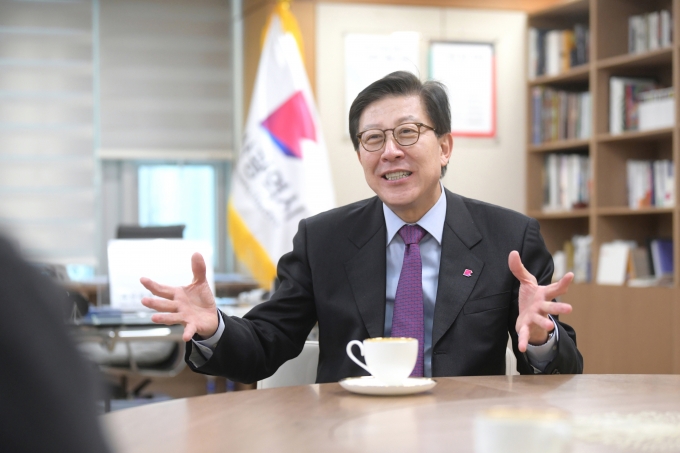Last month, I complained about how the Brazilian and Canadian stock markets are 93% owned by Brazilians and Canadians, but Koreans seem to hate their own stock market, having created a situation where foreigners own 44% of it -- and way over 50% for some of the most valuable blue-chip companies.
This disequilibrium has led to a very strange alliance in Korea just in the last few days. Even though the IMF told the government eight weeks ago that Hostile M&A was unlikely in Koreaa, in response to the Chey, Tae-Won problem at SK Corp., elderly Chaebol campaign-finance bigwigs have managed to persuade young Uri Party idealists they must leap to protect Korea from the illusory spectre of hostile foreign M&A -- by passing legislation which protects the interest of the Chaebols. Somehow, the wealth-redistributing Uri Party Robin Hoods have been hoodwinked by the Chaebol Sheriff of Nottinghams! Who could have predicted that?
Supposedly to protect the economy and National Security, controlling shareholders will now be able to speed-launch dilutive rights offerings to boost friendly stakes, harming all outside shareholders. Soon, foreigners will have to register for approval of their voting intentions at Korea's Ministry of Commerce. What comes next, tattooing numbers on us? Call me old-fashioned, but instead of foolishly fighting off the 44% foreign owners, another approach I'd suggest instead would be to get Koreans more interested in their own stock market. This strange concept might push the KOSPI up to 2,000, whilst the tattoo approach would certainly drive it down below 300.
But what are the obstacles keeping Koreans from investing in it? Why do Koreans hate their own stock market?
The notorious Buy Korea scandal five years ago left a really bad taste. It's only natural that retail investors lacking stockpicking experience will prefer handling their equity allocation via mutual funds or equity-type Beneficiary Certificates. During the 1999 rally, more that twenty trillion won poured into these types of investment products. The biggest of all was Hyundai Securities' "Buy Korea" Fund.
As memories of the 1997 currency crisis had not faded, Hyundai used a rather opportunistic campaign aimed at the most naive investors (70% of them were housewives.): "Buy Korea to Save Korea." The sales pitch was that investing in Korean stocks would strengthen Korea's wounded economy, just as the gold donations had in 1Q98. Some customers were even guaranteed 30% annual returns! But instead of getting exposure to stocks of the best companies in Korea, Buy Korea clients got a few stocks, along with plenty of junk bonds, commercial paper, manipulation games, illicit loans, etc., in the worst companies in Korea, starting with Daewoo -- which was right on the verge of becoming the biggest bankruptcy in the history of the world.
The Buy Korea managers probably tried to pick stocks intelligently. However, the problem is that at Korean financial institutions, customer money sometimes becomes available for all kinds of uses. If chaebol A and chaebol B are both issuing junk bonds, presto, their financial arms are free to buy each others bonds, not risking their own assets, but customer money instead. If MOFE pushes out another Stabilization Fund or the KDB is demanding National Service Loans (fka Policy Loans) for another zombie company, customer money can be shoveled into these sinkholes, too. There is just an irresistible urge for financial institutions to deploy customer money into these numerous bad investments, not to mention secretive stock price manipulation games. You almost never see the big-shots having to dig into their own pockets to fund any of this.
When Buy Korea suffered losses as a result, a lot of ordinary Koreans who had thought they'd be participating in a rising stock market took a loss instead. The Chairman of Hyundai Securities, Lee, Ik-chi, was arrested, but putting him in jail did not bring back the money customers lost. The painful memories linger today.
That was then, this is now? Not really. If you think ironclad regulations will prevent this kind of abuse going forward, think again. As usual, the devil is in the details. Many funds still must have minimum 10% "cash" - money that can be lent out to God knows whom. What the regulators call "pure equity" funds need only consist of a paltry 70% equity, which means that a full 30% can be shunted aside into junk bonds, commercial paper, and all kinds of questionable investments, governed by less than airtight regulations. So, what Daewoo was to Buy Korea, LG Card could very well be to mutual funds today. Sure, the "Buyer Beware" rule applies; there are numerous ways for a prospective investor to check out the past performance of the manager. However, not all less experienced investors do this. And besides, managers change.
The average Korean views the stock market like a casino. You make an investment, it's just a gamble, maybe you'll win, maybe you'll lose. There is no sense that being a shareholder actually means holding a share of ownership of the company. Koreans have no faith in share ownership because they harbor a deep-seated hostility towards business. A Gallup poll two weeks ago indicated 67% of Koreans harbor negative sentiment toward rich people, 62% toward company owners, with the highest level of disapproval (43%) directed at chaebols. In the final analysis, this is because the average Korean has no hopes of ever becoming the Chairman of the Board of a big company.
In a successfully free-market economy, the shareholders always vote for a Board of Directors which will focus only on the success of the company. The Board is legally required to represent the interest of all the shareholders, and always picks a Chairman and executives best suited to run the company. Korea, however, is a feudal economy, and the Chairman must always be a member of the founding family, which (as pointed out last week by the FTC) often has less than 2% ownership. No Korean Board will ever promote an average Korean to be Chairman, now matter how qualified, because Korea is a feudal economy which prohibits this. So, why would the average Korean risk his money investing in companies he could never hope to run? The founding families are the nobility. He is a serf. He doesn't like them, and certainly isn't about to trust them with his hard-earned money.
My only hope is that the government will turn its attention to the needs of the Korean retail investor now, and take steps to restore his confidence in Korea's stock market and corporate sector. Foreign investors have confidence in Korea already, that's why we own 44% of the stock market, the highest level of foreign ownership amongst the world's top ten economies.
Henry M. Seggerman is President of International Investment Advisers (IIA - //www.iiafunds.com), an investment management company which has focused exclusively on the Korean market for twelve years. Since inception IIA's Korea International Investment Fund (KIIF) has outperformed the KOSPI index by 289%. In its 3Q04 edition, Barclay reported KIIF's three-year annualized return as 28%, and ranked it #6 amongst all Emerging Markets Asia funds.
- VIEW 6,928
- 2005.01.05 10:02
by Henry M. Seggerman
|
<저작권자 © ‘돈이 보이는 리얼타임 뉴스’ 머니투데이, 무단전재 및 재배포 금지>
|
















![[영상]술 먹고 기절, 눈 떠보니 "합의한 성관계?"](https://thumb.mt.co.kr/11/2024/04/2024042307442475800_1.jpg/dims/resize/100x/optimize/)
!["환율 1400원" 찍히자 달러 들고 우르르…명동 환전소 '북적'[르포]](https://thumb.mt.co.kr/11/2024/04/2024042214490689339_1.jpg/dims/resize/100x/optimize/)





![[단독]어도어 경영진, 글로벌 국부펀드에 매각 검토...애널 실명도 등장](https://thumb.mt.co.kr/11/2024/04/2024042308451477838_1.jpg/dims/resize/100x/optimize/)




























![영하 13도, 길냥이 죽음 막을…'얼지 않는 물그릇'[남기자의 체헐리즘]](https://thumb.mt.co.kr/10/2024/01/2024012701364573421_1.jpg/dims/resize/100x/optimize)
















!['눈물의 여왕' 김수현♥김지원, 이유 있는 달달함 치사량 [★FOCUS]](https://menu.mt.co.kr/upload/main/2024/2024042410380197862958_mainTop.jpg)







![미국 대선, 이번엔 다를까? 6개주만 보면 알 수 있다 [PADO 편집장의 '미국 대 미국']](https://i4.ytimg.com/vi/7kc1ddGnWtE/hqdefault.jpg)


















